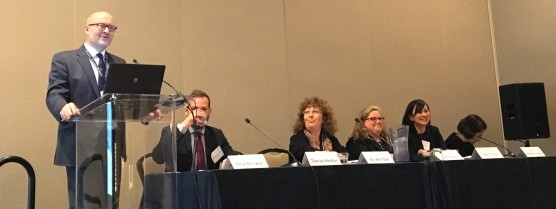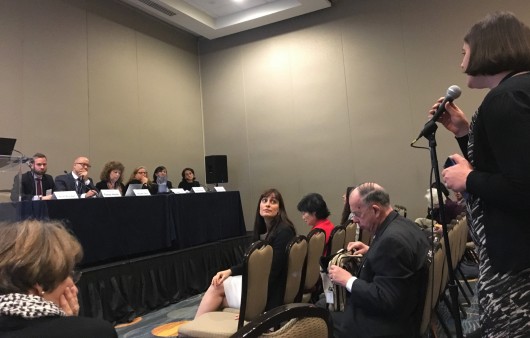The Friday, April 6, 2018 ASIL Annual Meeting panel International Law as a Tool in the Fight against IUU Fishing and Seafood Slavery provided a look at illegal, unreported, and unregulated (IUU) fishing and seafood slavery issues from the perspectives of esteemed panelists who engage with these topics from different vantage points. Nick Renzler, Foley Hoag LLP, moderated the panel.

Judge Tomas Heidar of the International Tribunal for the Law of the Sea speaks at the ASIL Annual Meeting on Friday, April 6, 2018.
Judge’s Perspective: Background on IUU Fishing
Judge Tomas Heidar, a member of the International Tribunal for the Law of the Sea (ITLOS) since 2014, provided background on IUU fishing issues. Judge Heidar explained there is no universally accepted definition of IUU fishing, but the most widely adopted definition is contained in the IPOA-IUU, 2001. IPOA-IUU contains measures aimed to deter and eliminate IUU fishing through state cooperation.
One way to combat IUU fishing is port state measures blocking vessels engaged in IUU fishing from unloading at a state’s docks. If widely adopted, this can make IUU fishing not profitable by forcing IUU fishing vessels to travel great distances to find a dock that will accept them. This is one of the general purposes of the 2009 FAO Port State Measures Agreement. The agreement broadly defines terms, such as “fishing related activities,” to encourage expansive enforcement. States were initially slow to ratify so the agreement only entered into force in 2016 once 25 parties had ratified, but since entry into force ratification has sped up and there are now 53 parties.
One agreement to keep an eye on is the Agreement to Prevent Unregulated High Seas Fisheries in the Central Arctic Ocean. Negotiations just concluded in November 2017 and signature is expected in 2018.
Academic Perspective: ITLOS 2015 Advisory Opinion
Nilufer Oral, Istanbul Bilgi University Law Faculty and United Nations International Law Commission, focused on a major recent development in IUU fishing, the ITLOS 2015 Advisory Opinion. This is a landmark opinion for a couple reasons.
First, this is the first time the full tribunal has issued an advisory opinion.
Second, the opinion clarifies flag state responsibilities under UNCLOS, in particular explaining that flag states must meet due diligence obligations in exercising control over the ships flying their flag. IUU fishing is not specifically mentioned in UNCLOS, but the advisory opinion seeks to include IUU fishing under UNCLOS, although some commentators believe more detail would have been helpful on this point.
While this is a landmark opinion, it is only an advisory opinion. Oral believes it’s time to bring a contentious case to more powerfully use international adjudication to combat IUU fishing.
State Perspective
Alexa Cole, U.S. NOAA, Office of General Counsel, Enforcement Section, spoke about IUU fishing from the state perspective. NOAA is fortunate to have thirteen prosecutors working in this area. This relatively high number allows NOAA to attend Regional Fisheries Management Organizations (RFMO) meetings and be directly engaged in negotiating enforcement measures. This, in turn, better allows NOAA to engage in enforcement. RFMO goals include encouraging management of relevant species; creating monitoring, control, and surveillance (MCS) measures, such as expanding high seas boarding and inspection; and creating compliance monitoring schemes.
In the big picture, Cole believes major international agreements play an important role setting global standards, but they suffer from being tough to negotiate. This challenge leads them to become stale as they are not renegotiated to address new issues. For example, UNCLOS’s discussion of “hot pursuit” does not take into account new technology. As a result, new issues need to be addressed in alternate ways. For example, the Western & Central Pacific Fisheries Commission (WCPFC) coordinates sharing vessel monitoring data, which allows sharing on hot pursuit and other issues.
Corporate Perspective
Anbinh Phan, Director of Global Government Affairs, Walmart Corporation, provided the corporate perspective. Walmart takes a multi-stakeholder approach. The company is a Seafood Task Force member and committed to only selling seafood from sources certified by a third party by 2025. They also supported an International Justice Mission study. Looking to the future they hope to work toward preventing forced labor in the first place, use technology to disrupt the industry, and see the need for international and national law to create solutions.
Litigator Perspective
Agnieszka Fryszman, Cohen Milstein, LLP, provided the litigator’s perspective. As background, Fryszman pointed to the ILO Caught at Sea Report. Fryszman shared frustrations with how trafficking aboard seafood vessels may not be discovered at U.S. ports because of U.S. laws prohibiting those on board from exiting the boat.
Fryszman recently litigated Sorihin and Abdul Fatah v. Thoai Van Nguyen dba Sea Queen II, Case No. 16-5422, in the U.S. District Court for the Northern District of California. In this case two Indonesian men jumped ship in San Francisco, California to escape and then sued the ship’s captain for horrible working conditions. They settled the case and included in the settlement requirements that the captain establish a code of conduct and distribute a help card to employees to prevent similar incidents. The Associated Press is following up on implementation and Fryszman is waiting to hear if the captain has implemented the settlement requirements.
Fryszman noted one of the major challenges with this litigation is jurisdictional. They were only able to assert jurisdiction over the ship’s captain because he’s from San Jose, California, even though there were many other culpable parties. Fryszman sees jurisdiction as a major barrier to successful seafood slavery litigation.
Fryszman located just two other related cases: one in New Zealand and one in Thailand.

An audience member asks a question to the panel at the International Law as a Tool in the Fight Against IUU Fishing and Seafood Slavery session at ASIL 2018.
Closing
In Q&A, one attendee asked if more international agreements are needed. The panelists generally agreed there isn’t a strong need for more international agreements on this issue right now. Instead they want a focus on domestically implementing the agreements already in place to effectively impose liability. It appears the next frontier for IUU fishing and seafood slavery is finding the best ways to use courts to implement the law in these areas.
Pingback: New FCIL Librarian Series: ASIL Annual Meeting | DipLawMatic Dialogues